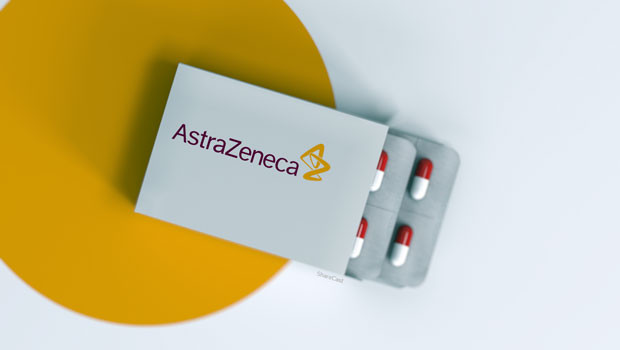AstraZeneca hikes guidance after strong third quarter

AstraZeneca released its financial results for the third quarter and first nine months of 2023 on Thursday, hiking its full-year guidance on the back of a robust performance and momentum in several segments.
AstraZeneca
10,400.00p
16:10 23/12/24
FTSE 100
8,082.54
16:10 23/12/24
FTSE 350
4,460.52
16:10 23/12/24
FTSE All-Share
4,418.34
16:10 23/12/24
Pharmaceuticals & Biotechnology
19,959.16
16:10 23/12/24
It also announced an exclusive licence agreement with Eccogene for potential obesity treatment and reported positive results from Imfinzi for treating hepatocellular carcinoma (HCC).
The FTSE 100 pharmaceutical giant said its total revenue reached $33.79bn, marking a 5% increase despite a $29bn decline attributed to Covid-19 medicines.
Excluding Covid-19 medicines, both total revenue and product sales showed significant growth, increasing by 15%.
Notable revenue increases were seen in oncology medicines at 20%, cardiovascular, renal, and metabolism (CVRM) at 19%, research and innovation at 9%, and rare diseases at 12%.
AstraZeneca also reported a core product sales gross margin of 82%, reflecting a two-percentage-point increase due to the decline in sales of lower-margin Covid-19 medicines.
The core operating margin increased by three percentage points, driven in part by a $712m gain from an update to contractual relationships for Beyfortus, recorded in core other operating income.
Core earnings per share rose by 17% to $5.80.
Looking ahead, AstraZeneca revised its guidance for 2023, with total revenue excluding Covid-19 medicines now expected to increase by a low-teens percentage at constant exchange rates (CER) and core earnings per share set to increase by a low double-digit to low-teens percentage at constant currency.
“Our company continued its strong growth trajectory in the third quarter with total revenue from our non-Covid-19 medicines up 13% compared to last year,” said chief executive officer Pascal Soriot.
“We initiated several phase three trials of high-potential molecules this quarter, including for volrustomig, our PD‑1/CTLA-4[10] bispecific antibody.
“Our portfolio of bispecifics has the potential to replace the first-generation checkpoint inhibitors across a range of cancers.”
Soriot noted that the firm also initiated a fixed-dose combination study of zibotentan with Farxiga, which had the potential to significantly improve outcomes for patients with kidney disease not well controlled on the current standard of care.
“I am excited about accelerating our cardiometabolic and obesity pipeline with today’s licensing agreement for ECC5004, a potential best-in-class, oral GLP-1RA.
“This molecule could offer an important advance, as both a monotherapy and in combinations, for the estimated one billion people living with cardiometabolic diseases such as type-2 diabetes and obesity.
“Given the momentum in the year to date we have increased our full-year guidance for total revenue excluding Covid medicines as well as for core earnings per share.”
In a separate announcement, AstraZeneca said it had entered into an exclusive licence agreement with Eccogene for ECC5004, an investigational oral once-daily glucagon-like peptide-1 receptor agonist (GLP-1RA) designed to treat obesity, type-2 diabetes, and other cardiometabolic conditions.
Preliminary results from the phase one trial showed a promising clinical profile for ECC5004, with favourable tolerability and encouraging reductions in glucose levels and body weight compared to a placebo.
Under the agreement, Eccogene would receive an initial upfront payment of $185m.
Additionally, Eccogene stood to earn up to $1.83bn in future clinical, regulatory, and commercial milestones, as well as tiered royalties on product net sales.
AstraZeneca was granted exclusive global rights for developing and commercialising ECC5004, except in China, where Eccogene retained the right to co-develop and co-commercialise alongside AstraZeneca.
“With the number of people living with cardiometabolic conditions and obesity today already over one billion, there is a need for continued innovation and next generation therapeutic options,” said Sharon Barr, executive vice-president of oncology research and development.
“Building on the promising phase one clinical data generated by Eccogene, we believe this oral GLP-1RA molecule could offer alternatives to current injectable therapies both as a potential monotherapy as well as in combination for cardiometabolic diseases such as type-2 diabetes, as well as for obesity.
“ECC5004 further strengthens our existing pipeline addressing both incretin and non-incretin pathways, including our GLP-1/glucagon dual agonist AZD9550, and long-acting amylin analogue AZD6234.”
Finally, AstraZeneca reported that Imfinzi, or durvalumab, showed positive high-level results in the ‘EMERALD-1’ phase three trial when used in combination with transarterial chemoembolisation (TACE) and bevacizumab for the treatment of hepatocellular carcinoma (HCC) in patients eligible for embolisation.
The company said the trial demonstrated a statistically significant and clinically meaningful improvement in the primary endpoint of progression-free survival (PFS) compared to TACE alone.
It said the study continued monitoring the secondary endpoint of overall survival.
Hepatocellular carcinoma, the most common type of liver cancer, is the third-leading cause of cancer-related deaths worldwide, with AstraZeneca claiming that around 900,000 new cases are diagnosed annually.
Between 20% and 30% of patients were eligible for embolisation - a procedure that obstructs the blood supply to tumours and can also deliver chemotherapy or radiation therapy directly to the liver.
Despite being the standard of care in that setting, many patients who undergo embolisation experience rapid disease progression or recurrence.
“These positive results for Imfinzi-based treatment in EMERALD-1 may bring the potential of immunotherapy to patients with earlier stages of liver cancer,” said Susan Galbraith, executive vice-president of oncology research and development.
“We look forward to discussing these data with regulatory authorities and seeing the survival data mature over time, which will be important as we aim to bring this novel treatment option to patients.”
Reporting by Josh White for Sharecast.com.